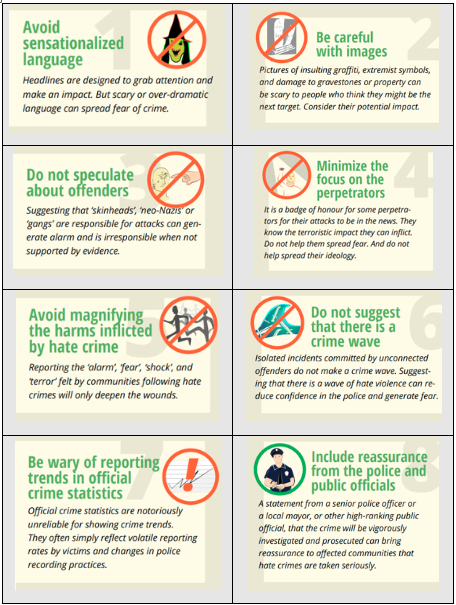Minimising the collateral damage of hate crime: Some tips from Belarusian journalists and editors for sensitive media reporting
By Paul Iganski & Andrei Klikunou (Illustration: Andra Voinea)
The media play a significant role in spreading news about hate crime. The same goes for other types of crime. Hate crime can be different, however—especially so when the impact upon victims and communities is considered. This will be well known to hate crime specialists reading this blog. However, it will not be so obvious to many journalists and editors who are not experts in the subject.
Hate hurts
Those familiar with the research evidence will know that hate crime can strike deeply inside the persons targeted—potentially hurting more deeply than some other crimes. Victims can perceive the offender’s actions as an attack upon the core of their being. So too can others who share the victim’s social identity and come to hear about the crime. The wounds inflicted are aggravated by a message often perceived to be sent by the offenders which is that the victims, and others who share their social identity, are devalued, unwelcome, disparaged, and despised. It is an exclusionary message. Each act of hate crime sends a threat of future violence. Victims carry around with them the reason for being attacked—their social identity—and therefore they know they can be a potential target again.. A terrorising message is also sent to everyone who shares the victim’s social identity: “you could be next.” Hate crime can thus inflict collateral damage as it spreads well beyond the person targeted and affects others like them who come to hear about the crime—often through the news media.
Reporting Hate: good practice for ethical journalism
When writing about hate crime, journalists and editors can avoid adding to the collateral damage through thoughtful reporting. Since 2016, knowledge about the harmful impact of hate crime has been injected into pro bono training workshops for Belarusian journalists and editors in contributions to ‘Tolerance Schools’—human rights training schools held in Poland, Lithuania and Ukraine. The Schools are organised by the LGBTQ organisation Journalists for Tolerance (J4T) (http://j4t.by). Around 60 journalists and 20 editors have participated in the hate crime workshops to date. They are asked to critically evaluate examples of news media reports of incidents of hate crime given the understanding introduced about the harmful impact on victims and communities. Then when asked to think about how they might appropriately advise rookie journalists, they work together on producing tips to sensitive media reporting of hate crime.
The top ten tips produced to date:

The tips are not a matter of constraining journalistic freedom and editorial independence. They concern weighing choices about the focus of a news story, the sources used to construct the story, and the words used in reporting. Silence about hate crime works to obscure its impact. Silence sends a message that victims’ experiences are of no concern. Therefore, the media can play a vital role in raising awareness about the problem. However, thoughtful reporting is necessary to avoid spreading the collateral harm that can be inflicted by hate crime.
The full guide can be downloaded, in English or Belarusian, at: https://iganski.org/pro-bono-civil-work
Paul Iganski is Professor of Criminology & Criminal Justice at the Lancaster University Law School, UK, and Chair of SMILE, a conflict mediation charity in the North West of England.
Andrei Klikunou is co-ordinator of Journalists for Tolerance
Andra Voinea: https://www.behance.net/shapespin
The workshops with Belarusian journalists were generously supported by Lancaster University kick-starter Global Challenges Research Funds, Lancaster University Impact Acceleration Funds, and FASS Research Impact funds.
We welcome comments from readers to: p.iganski@lancaster.ac.uk
